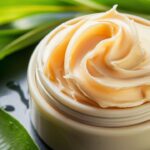Imagine treating your skin to a luxurious, golden nectar straight from nature’s bounty. Honey, renowned for its benefits, has been cherished for centuries.
When infused into soap, honey transforms your skincare routine into an indulgent, spa-like experience. But honey soap in skincare is more than just a fragrant delight. It’s a powerhouse of benefits that can rejuvenate and nourish your skin.
Composition of Honey Soap
Natural honey soap combines oils, lye (for creating soap), and, of course, honey.
The choice of oils can vary, but common ones include olive, coconut, and almond oil. The oils offer cleansing and moisturizing properties.
Lye goes through a chemical reaction with the oils to create soap, and honey is usually added at the end for its beneficial qualities.
Soap Secrets: Why Homemade Soaps Are Your Skin’s New Best Friend
Top Benefits of Honey Soap
Here are the main benefits of honey in soap:
Moisturizing and Hydrating
Honey in skin care is a natural humectant, which means it attracts and retains moisture. This translates to a gentle cleanse that doesn’t strip away your skin’s natural oils.
Instead, the honey draws moisture to your skin and helps it hold onto it, leaving you with a soft, supple feeling.
Antibacterial and Antimicrobial Properties
Honey soap’s antibacterial properties come from the natural power of honey itself. Honey contains hydrogen peroxide, an antiseptic that helps combat bacteria on the skin’s surface.
Honey’s high sugar content creates a hypertonic environment, drawing water out of bacteria and inhibiting their growth.
While it can help reduce bacteria, honey soap shouldn’t be solely relied upon for intense antibacterial action. Always check the honey soap ingredients to ensure they meet your skin’s needs.
Antioxidant-Rich
Honey soap is rich in antioxidants, which help protect skin from environmental stressors and promote a healthy glow.
Honey soap’s antioxidant edge comes from the treasure trove of antioxidants naturally present in honey soap. Antioxidants are molecules that fight free radicals (unstable molecules that damage skin cells and contribute to signs of aging like wrinkles and fine lines)
Soothing and Healing
Honey has anti-inflammatory properties, which can help calm and reduce redness associated with conditions like eczema. The humectant nature of honey also keeps the skin hydrated, reducing discomfort and itching and allowing the skin to focus on repair.
Thanks to its anti-bacterial properties, honey soap can also help prevent minor wounds or irritations, making it suitable for sensitive skin.
Natural Exfoliant
Honey soap’s natural exfoliating properties are more subtle compared to other scrubbing ingredients. Here’s why:
Crystallized Honey:
Raw honey naturally crystallizes over time. These tiny crystals can provide a gentle buffing effect, helping remove dead skin cells without irritation.
However, the amount of exfoliation will depend on the honey used and how much crystallization has occurred. Organic honey soap enthusiasts often look for this gentle exfoliation in their natural soap products.
Added Exfoliants:
Many honey soaps incorporate additional exfoliating ingredients like ground oats, seeds, or loofah for a more pronounced scrubbing action.
The added ingredients provide a wider range of exfoliation levels to suit different skin types and preferences. Some brands even create raw honey soap with extra exfoliating power.
Overall, honey soap offers a milder form of exfoliation compared to harsh scrubs.
Comparing Honey Soap with Other Natural Soaps
When it comes to natural soaps, the options are vast and varied. We’ll compare honey soap with other organic soaps.
Honey Soap vs. Oatmeal Soap
Honey Soap:
Ingredients: Primarily made with honey, which is known for its moisturizing and antibacterial properties.
Benefits: Honey is a natural humectant, drawing moisture into the skin, making it an excellent choice for dry skin. It’s gentle and moisturizing properties make it ideal for sensitive skin.
Oatmeal Soap:
Ingredients: Made with ground oats, known for their exfoliating and anti-inflammatory properties.
Benefits: Oatmeal soap gently exfoliates the skin, removing dead skin cells and promoting a smoother, brighter complexion.
Skin Types
Honey Soap: Best for dry, sensitive, and acne-prone skin due to its gentle and moisturizing nature, making it perfect for using honey soap for acne.
Oatmeal Soap: Ideal for normal to sensitive skin, especially if you need gentle exfoliation and soothing relief from inflammation.
Honey Soap vs. Activated Charcoal Soap
Activated Charcoal Soap:
Ingredients: Made with activated charcoal, known for its deep-cleansing properties.
Benefits: Charcoal soap excels in detoxifying the skin by drawing out impurities, dirt, and excess oils. It’s highly effective for acne-prone and oily skin.
Honey Soap: Suitable for dry, sensitive, or combination skin. Creating your own DIY honey soap can be a fun and rewarding experience, allowing you to customize the ingredients to your skin type.
Activated Charcoal Soap: Best for oily, combination, and acne-prone skin due to its ability to absorb excess oil and unclog pores.
User reviews
Many people have shared positive experiences using honey soap for body care, noticing a significant improvement in acne, skin hydration, and overall skin health ➋ .
Personal stories on forums and blogs also highlight how users integrate homemade honey soap into their skincare routines, achieving noticeable results including reduced acne and softer skin ➎. Additionally, using honey soap can be a great way to incorporate the natural benefits of honey into your daily routine.
A dermatologist perspective
Dr. Nischal K, a consultant dermatologist at Nirmal Skin and Hair Clinic in Bangalore, discusses the benefits and limitations of using honey soap recipes on the skin.
He explains that organic honey soap contains sugar, antioxidants, micro nutrients, and has anti-bacterial properties. Honey can be used to reduce inflammation, soothe skin, and act as an antioxidant.
However, Dr. Nischal warns that the purity of the honey should be checked before use.
https://www.youtube.com/watch?v=IDJL7hgOT-I
How to Use Honey Soap for Best Results
To use honey soap for best results:
- Cleanse your face: Start with a clean face. Use a gentle cleanser to remove any dirt, oil, or makeup before using honey soap.
- Lather up: Wet the honey soap and rub it between your hands to create a creamy lather. Apply the lather to your damp skin.
- Massage: Gently massage the lather into your skin using circular motions. This helps improve circulation and ensures the honey penetrates your skin.
- Let it sit: Allow the soap to sit on your skin for a few minutes. This gives the honey time to work its moisturizing and healing magic.
- Rinse off: Rinse thoroughly with warm water, ensuring all soap is removed. Pat your skin dry with a soft towel.
FAQs on Honey Soap Benefits
What are the main benefits of using honey soap?
Honey soap is known for its moisturizing properties, antibacterial qualities, and ability to soothe and heal the skin.
How does honey soap help with acne?
Honey has natural antibacterial and anti-inflammatory properties that can help reduce acne-causing bacteria and soothe irritated skin. Its gentle exfoliating properties also help unclog pores, reducing the occurrence of breakouts.
Is honey soap suitable for all skin types?
Yes, honey soap is generally suitable for all skin types, including sensitive, dry, oily, and combination skin.
Can honey soap help with dry skin?
Absolutely. Honey is a natural humectant, meaning it attracts and retains moisture. Honey soap can help hydrate and nourish dry skin, leaving it soft and smooth.
Does honey soap have anti-aging benefits?
Yes, honey soap can have anti-aging benefits. Honey is rich in antioxidants, which help fight free radicals that cause premature aging. Regular use can help improve skin elasticity and reduce the appearance of fine lines and wrinkles.
How does honey soap benefit sensitive skin?
Honey soap is gentle and soothing, making it ideal for sensitive skin. It can help calm redness and irritation while providing essential moisture, making the skin feel soft and comfortable.
Can honey soap be used on the face and body?
Yes, honey soap can be used on both the face and body. Its gentle formula is suitable for all-over use, helping to cleanse and moisturize the skin without causing dryness or irritation.
Are there any side effects of using honey soap?
Honey soap is generally safe for most people, but it’s always a good idea to do a patch test first, especially if you have allergies to bee products. If any irritation or allergic reaction occurs, discontinue use immediately.
How often should I use honey soap for best results?
You can use honey soap daily as part of your regular skincare routine. Using it consistently can help maintain the skin’s moisture balance and keep it looking healthy and radiant.

I’m a devoted organic skincare enthusiast, passionate about the natural, wholesome goodness that organic products bring to our skin.
Organic skincare isn’t just a hobby for me—it’s a lifestyle. Every product I use, recommend, and write about has been carefully chosen for its purity and effectiveness. Everything I write about is backed by scientific studies, dermatologists’ opinions, and user experiences.
I also excel at tackling skincare challenges with innovative, organic solutions.


